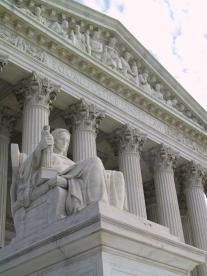On June 17, the US Supreme Court held that so-called "pay for delay" or "reverse payment" arrangements between branded and generic drug manufacturers could be illegal under antitrust laws, although only after a full rule of reason test. The 5-3 decision in FTC v. Actavis (Justice Alito recused himself) resolves a circuit split regarding multiple challenges by the Federal Trade Commission and private parties to these arrangements.
This series of cases arises out of the intersection of the antitrust laws, patent law and the Hatch-Waxman Act intended to promote the approval and marketing of lower-price generic drugs. As explained more fully in our prior client alerts found here and here, that Act allows generic drug manufacturers to rely on much of the work of the brand name drug manufacturer to develop generic drugs and seek Food and Drug Administration approval. To receive final FDA approval and market the drug, the generic drug manufacturer must certify that its drug does not infringe the branded manufacturer's patent or that the patent is invalid. Frequently this is done by making a "paragraph IV" certification that the patent "is invalid or will not be infringed by the manufacture, use, or sale" of the drug. Such a certification provides standing to a patent-holder to sue the generic drug manufacturer for patent infringement. In a number of instances, this sort of high-stakes patent litigation has been settled before final judgment. Many of the settlements in these cases have the same two elements: the generic manufacturer agrees to delay introduction of its product to a date later than if the patent were ruled invalid but earlier than if the patent were held not invalid; and the brand name manufacturer agrees to pay the generic manufacturer compensation, often either or both for the delay in generic introduction and for the provision of some ancillary services.
The FTC and others have seen these arrangements as anti-competitive, and the Third Circuit in the In re K-Dur Antitrust Litigation decision held them to be prima facie evidence of an unreasonable restraint of trade. (The D.C. and Sixth Circuits took a similar view.) The Eleventh Circuit in this case — and the Second and Federal Circuits — held such agreements immune from antitrust attack so long as the settlement did not extend the scope of the patent.
The majority, per Justice Breyer, reversed and remanded the case and resolved the circuit split by finding that such agreements might violate the antitrust laws, even if the patent's scope is not expanded, and so must be judged under antitrust law's rule of reason. The majority did not think its approach novel and cited several of its old opinions for the notion that patent-related settlement agreements sometimes can violate the antitrust laws. The majority emphasized that its ruling was not meant to prevent a settlement where the patentee allows the other party to enter the market prior to the end of the patent or settlements where a party with monetary damage claims settles for a smaller payment of money. Here, the majority emphasized, the generic pharmaceutical companies receiving the payment made no claims for damages and promised only to forego competing for an agreed period of time. Even then, the majority did not go as far as the Third Circuit (or as far as the FTC wanted) and declare such payments automatically or presumptively illegal; instead, the majority would allow such payments if justified as mere "cost of litigation" settlements or compensation for legitimate services rendered.
In remanding the Actavis case back to the Eleventh Circuit, the majority identified five sets of considerations from the facts of the AndroGel settlement that led to the conclusion that the FTC should have been given the opportunity to prove its antitrust claim:
-
The specific restraint at issue has the potential for genuine adverse effects on competition;
-
the anticompetitive consequences will at least sometimes prove unjustified;
-
where a reverse payment threatens to work unjustified anticompetitive harm, the patentee likely possesses the power to bring that harm about in practice;
-
an antitrust action is likely to prove more feasible administratively than the Eleventh Circuit believed; and
-
the fact that a large, unjustified reverse payment risks antitrust liability does not prevent litigating parties from settling their lawsuits.
The vigorous dissent from Chief Justice Roberts viewed the case as one raising patent issues that should be judged under patent standards, namely the "scope of the patent" test used by the Eleventh Circuit and other appellate courts. The dissent saw no support in the Court's precedent for the majority's approach; indeed, the dissenting opinion walked through every one of the cases cited by the majority to demonstrate that they all stood for the proposition that antitrust laws only apply to such settlements if the scope of the patent is exceeded. The dissent predicted fewer such settlements — and perhaps fewer generic drugs raising such patent issues to be settled — because of the expense and uncertainty of a potential rule of reason litigation that might be filed by the FTC or private litigant. The parties are less likely to settle suits over the validity of a patent if doing so would open them up to an antitrust fight over the justification for any payments or, possibly, once again the scope of the patent.
While the opinion did not accept the FTC's argument that such agreements were presumptively unlawful and that courts should proceed via a "quick look" rule of reason analysis, the current FTC Chairwoman did call the decision "a significant victory for American consumers, American taxpayers and free markets." The Commission will go forward with this particular case and determine shortly how it can use the opinion to challenge other similar agreements. The EU's Competition Commission has expressed similar competition law concerns about such agreements.


 i
i


